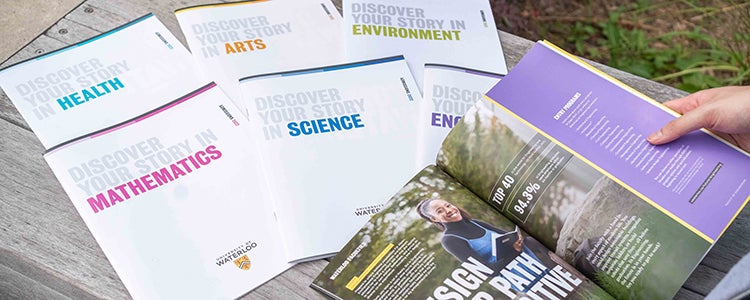Written by Naomi (she/her), student
Thinking about what you’ll do after high school? Wondering if university could be for you?
Let’s explore the route to university so you can consider whether it’s the right path and plan your high school time accordingly!
How can I tell if university is the right path for me?
Figuring out if you want to pursue an undergraduate degree will take time, resources, and a lot of self-reflection.
To start, personal interest surveys and career tests are great tools that can help you determine whether your interests align with university. Your high school guidance counsellors are also a valuable resource in helping you map out your future.
I asked a local high school guidance department head, Greg Todd, for his advice for students contemplating their paths after high school: “We want students to explore as many future options as possible,” says Greg. He also provided some helpful questions to help you kickstart that journey:
- How do you think you learn best?
- What subjects do you enjoy and love to learn about?
- What are your genuine passions and interests?
- Where do you see yourself in five years? 10 years? Beyond?
- What possible careers do you see yourself pursuing?
- What knowledge do you already possess about post-secondary?
“Answering these can lead to further questions about suitable pathways, and more focused discussions related to how various pathways can differ,” adds Greg.
What can university do for my future?
A journey as exciting as university can do a lot for your future. You can gain valuable life skills, discover your passions, and set yourself up for a successful life.

Help you find your passion
Exploring your passions can be an exciting adventure, especially if you’re not sure where your true interests lie just yet. University is a great environment to sort through any confusion you might have and learn more about yourself. You can explore your interests and future careers through various courses, extracurriculars, jobs (either part-time or through the co-op program) and initiatives.
I found my passion through Waterloo’s Honours Arts program thanks to its flexibility in choosing a major; you don’t have to pick one until the beginning of year two! I was torn between several paths, and experimenting with a bunch of subjects in first year helped me figure out what I wanted to continue studying. I fell in love with a rhetoric course and picked Rhetoric, Media, and Professional Communication as my major, which led me to my aspiring career in communications.
You never know; university might just help you discover what drives you!
Expand your knowledge
Going to university means exploring your curiosities and delving into subjects that intrigue you, ultimately broadening your education. Whether you’re learning more about your major, or taking various electives and minors, university lets you dip your toes into so many different pools of knowledge.
In my case, a rhetoric major has taught me a lot about persuasive language techniques, while a creative writing specialization has allowed me to tap into my inventive side with poetry writing and storytelling. Minoring in French lets me build on my existing years of French immersion, and I’ve continued to fuel my love of Greek and Roman history through my electives in Classical Studies (I’m talking to you, Percy Jackson fans).
Beyond the course material and textbooks, university also teaches you transferrable skills that are incredibly valuable for your future. Perfecting your communication, time management, teamwork, and critical thinking skills will benefit you in every aspect of your life.

Prepare you for the workforce
Those skills I just mentioned? They’re extremely vital in the workplace! Interacting with your co-workers and managers is a lot easier when you have the university-level practice of collaborating with your peers in professional environments and talking to professors. Plus, employers recognize and value university talent, which can help you stand out from other candidates and increase your chances of getting a job.
My time at Waterloo has significantly benefitted my career in more ways than one. My classes and extracurriculars developed those transferrable skills that I’ve leveraged in every job I’ve had since first year — which includes four, full-time co-op positions at diverse companies, and five different part-time roles with Waterloo. Plus, all those work experiences have definitely helped me plan my future career!
Increase your earnings
Undergraduate degrees open the doors to a lot of opportunities, and not just career wise, but monetary too. On average, university graduates earn more, especially if they pursue further schooling. The career opportunities and financial stability that accompany a university degree entice a lot of people, because they pave a secure path to long-term success.

What courses should I take in high school for university?
The courses you take in high school should align with the specific fields you’re thinking of pursuing. Most Canadian universities require at least six U/M Grade 12 courses for admission, with one being a Grade 12 English credit.
It’s important to understand the difference between the types of upper-year courses offered in high school. Some concentrate on meeting prerequisites for university, while other courses focus on preparing students for college programs or apprenticeships. These courses are categorized as U (University), C (College), or M (Mixed), a combination of both. Planning ahead will ensure you don’t miss any vital courses throughout high school that correlate to your intended path.
Take Waterloo’s Architectural Engineering program, for example. It requires specific Grade 12, U-level courses, such as advanced functions, calculus and vectors, chemistry, and physics, each requiring a minimum final grade of 70%. This means you have to thoroughly prepare in Grade 11 for success in those Grade 12 subjects. Plus, Waterloo’s Architectural Engineering page recommends courses like Grade 11 or 12 art classes and cultural studies, which means you’d have to start mapping out those courses in Grade 10. Hence, proactive planning is crucial if you’re thinking of going to university!

Exploring courses aligned with your potential interests also better prepares you for the paths you’re considering. Don’t forget that your guidance counsellors are there to assist you!
“We encourage students to meet with us to go over their plans and help ensure what they’ve selected makes sense, based on their academic background and future goals. We also recognize that pathways can change, so we continue to meet with students throughout the year to make course adjustments where necessary prior to the start of a new semester or school year,” adds Greg.
Do Grade 11 marks matter when applying to university?
While universities mainly consider Grade 12 marks, some schools may consider your Grade 11 performance because of the timeframe of university applications, which is usually before you receive all your final Grade 12 marks.
Grade 11 marks could be used as a prediction of your Grade 12 finals marks, which could secure you a spot before your final grades are available.
Discover, plan, succeed
Whichever path you may choose, planning your future is going to take some time. But, with dedication, exploration, and available resources, you can set off on a journey of self-discovery and pave your path to university along the way.
Related articles

How to find the university that's right for you
When you're starting to think about applying to university, you need to be proactive. That means visiting campuses, speaking to current students, going to information sessions, and even looking at a university's social media channel. If you're trying to decide between universities, here are a few tips that will help you gather all the important information.

What I wish I knew before applying to university
We sat down with seven student ambassadors to find out what they wish they had known when they were applying to university. We hope this helps you on your own journey to finding the right fit for you.

What to do when you can't decide
So, you don’t know what you want to do after graduation. The good news is, you’re not alone. If you know that you want to go to university, but you don’t know what you want program to apply to, don’t worry! We’ve got some tips that will help you to consider what your next steps could be.

